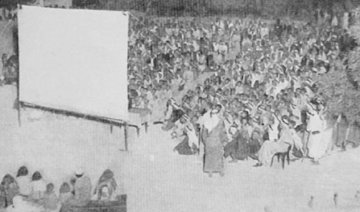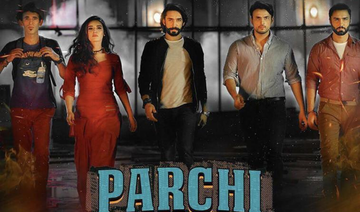LONDON: Reforms are set to transform the small screen as well as the big screen in Saudi Arabia as film fans anticipate the re-launch of cinemas across the Kingdom next year.
The benefits will be felt across the Saudi entertainment industry, which recently received a SR10 billion ($2.66 billion) boost from the government-owned Public Investment Fund to develop the sector in line with Vision 2030 ambitions.
Danny Bates, co-founder of streaming site Starz Play, said the reintroduction of cinemas to Saudi life is “a big positive for the video streaming sector” and “another step toward bringing quality entertainment to Saudi Arabia.”
Demand for movie content is growing rapidly in Saudi Arabia, with the Starz Play subscriber base doubling every six months since it launched two and a half years ago in the Kingdom.
“Our highest content consumption rates per month are coming from Saudi customers,” Bates said, identifying action and comedy as the most popular genres among subscribers there.
Vikings is the most popular series on the Saudi site, which receives around 40 million hits per month, with comedy classics including Friends and How I Met Your Mother also among the most-viewed.
Rather than creating competition, the introduction of cinemas is likely to catalyze further growth, raising the profile of film across the country, Bates explained.
“If Fast and the Furious 8 is playing in the cinemas, viewers can then turn to us to watch Fast and the Furious 1 through 7.”
In addition, the cinema is an ideal platform for the company’s advertising campaigns. “We’ve done this successfully in the UAE and Kuwait and would hope to do something similar in Saudi Arabia.”
According to Ravi Rao, CEO of Mindshare MENA, lifting the cinema ban will generate a new market for advertisers in Saudi Arabia, with “international and local brands vying to be there.”
The development will have a significant impact on advertising in the Kingdom, creating additional touch points and opening new channels of communication.
“Brand integration in movies will take a bigger turn when Saudi audiences can be targeted,” Rao said.
Advertising spending in MENA has seen a continuous decline in recent years but while the downturn is forecast to continue elsewhere, Saudi Arabia can anticipate growth in the industry, fueled by ambitious reforms that are creating new opportunities for investors.
“Ad spend in Saudi Arabia (including the PanArab TV spends) is now at under $2 billion from a high of $2.5 billion two years ago. But with all the cultural and economic glasnost that is sweeping the country, one can start expecting double-digit growth by 2020,” said Rao.
Ema Linaker, an executive director of digital at Golin, said the seismic shifts taking place as Saudi Arabia pursues its Vision 2030 targets will draw in advertisers formerly focused elsewhere in the region.
“Just this week, Saudi Arabia unveiled the 2018 budget, the largest in the Kingdom’s history with SR978 billion ($261 billion) public spending. With other markets like the UAE set to contract, a lot of the key advertising groups will be pivoting toward the Kingdom to secure a piece of that investment in 2018.”
More than 50 percent of the Saudi population is under 25 and between 65 and 70 percent are under 30 — demographics that appeal to advertisers anticipating an “abundant fanbase” for film in the Kingdom, Linaker added.
Pointing to a Comic-Con event in Jeddah last February attended by more than 10,000 people, she said: “Cinema looks set to become a national pastime for Saudis, thereby driving up audience figures and increasing the amount of people exposed to cinema advertising.”
Access to Saudi audiences will also have a bearing on how advertisers target consumers, injecting new vigor into the industry.
“From a cultural perspective, the opening up of cinema and entertainment sectors such as music and sports will fuel sponsorships and activation to increase ad spends in the near future,” said Roy M Haddad, director of WPP MENA.
“Brands and agencies will quickly re-invent and adapt to the new social and cultural movement in Saudi. Cinema will act as a trigger for many more changes in brand communication, experience and engagement,” he added.
Like the rest of the region, Saudi advertising is heavily weighted toward television, but with a major uplift across digital platforms, media companies are exploring new ways of engaging MENA audiences online.
“I believe like all Gulf countries we will see Saudi Arabia gradually shift toward digital advertising, driven by its mainly young and tech-savvy population,” said Linaker.
Citing Euromonitor, she said that Saudi Arabia’s advertising industry is anticipated to see flat growth over 2016-2021, as the introduction of VAT and additional taxes on certain commodities dampen private consumption.
Meanwhile, international media agencies will beef up their Saudi teams, creating a larger platform for local talent.
“Ogilvy, Leo Burnett and many other major ad agencies have a local footprint in Riyadh and Jeddah but these tend to be satellite offices and attracting quality ad talent has been a constant challenge,” said Linaker.
“However, we are starting to see young talent coming through the ranks born Saudi, educated in Saudi and passionate about developing a creative culture within the Kingdom.”
“With more investment, talent and opportunities arising, I can see Saudi becoming a hot bed of innovation and creativity quite quickly. It is a huge market and full of opportunity.”
Saudi cinemas will boost movie sector across KSA
Saudi cinemas will boost movie sector across KSA

What’s the matcha with everyone? The beloved green tea powder hits mainstream in Saudi Arabia

- The Japanese tea’s rise in the Kingdom is a cultural shift, one green cup at a time
RIYADH: Once a niche ceremonial tea in Japan, matcha is now gaining mainstream popularity in Saudi Arabia, thanks to a growing interest in wellness trends, evolving taste preferences, and the rise of mindful living.
The data backs the trend. According to a recent report by IMARC Group, Saudi Arabia’s green tea market, which includes matcha, was valued at $140.14 million and is projected to grow to $229.24 million by 2033.
Imports of packaged green tea nearly doubled in value between 2020 and 2023, suggesting a growing appetite for premium, health-focused drinks.
That growing demand is reflected on cafe menus and social media feeds across the Kingdom. Matcha lattes, once limited to specialty coffee shops, are now a fixture at trendy cafes and home kitchens alike.
Whether it’s served iced in sleek glass cups or whisked at home with oat milk, matcha is more than a drink. It’s a mood, a personal statement, and for many, a healthier way to start the day.
In Dammam, 19-year-old Sara Anas remembers her first taste of matcha back in 2019. “My dad likes trying new things,” she said. “It didn’t taste that great at first, but when matcha became popular in 2021, I got excited to try it again from local cafes.”
Now, she drinks it almost daily. “It might sound strange, but I don’t feel like it’s heavy on my body like coffee. It makes me feel more relaxed and gives me energy in a better way.”
Anas is part of a growing demographic. In Riyadh, 26-year-old Amal Al-Mutairi starts every morning with matcha. “I prefer it iced with vanilla milk to make the flavor smoother and lighter,” she said.
For her, the appeal began with reading about its benefits. “It gives me calm energy without the jitters or crash I usually feel after drinking coffee. It also helps me focus for longer periods.”
That calm, focused energy — often described as a “cleaner” caffeine experience — has made matcha especially popular among students and professionals.
For Anas, it’s a campus essential. “It’s a must before classes! It gives me the energy to continue my day at uni,” she said.
But matcha is more than functional. It’s become a lifestyle, embraced for both its wellness claims and its visual charm.
Globally, matcha’s rise is part of a broader wellness boom. Japan’s matcha production rose 185 percent from 2010 to 2023, and demand is now so high that suppliers are warning of shortages. Japan’s top growers have begun limiting exports to meet domestic needs.
Matcha’s health appeal is not just hype. Rich in antioxidants — especially a compound called EGCG — studies suggest it may reduce inflammation, support cardiovascular health, and aid cognitive function.
A recent Saudi study also found that over half of the participants believed matcha could help with weight management and blood sugar balance.
Still, experts note that moderation matters. Excessive matcha consumption may interfere with iron absorption and isn’t recommended for everyone.
The ritual of preparing matcha, especially for those who make it themselves, has become part of a broader shift toward slow, intentional living — something many young Saudis are leaning into.
That ritual is deeply personal for 27-year-old Leen Al-Zamil, who turned matcha from curiosity into a daily indulgence. “I was curious at first and honestly, I hated it so much, but I think (that’s) because it was hot,” she said. “I liked it cold with vanilla syrup and oat milk. I definitely can’t drink it alone.”
Now, she can’t go a day without it. “Sometimes twice or more,” she said. “I like its color … I enjoy every step of making it, and it just tastes so good. It brightens my mood.”
Al-Zamil is not the only one who sees matcha as more than just a drink.
For 28-year-old Mona Abdullah, matcha represents healing. “As someone who suffers from IBS, coffee tends to affect me for a while, whereas matcha provides steady energy without causing any discomfort,” she said. “I’ve stopped drinking coffee for the past three months. I now believe that matcha is a better source of caffeine compared to black coffee.”
Irritable bowel syndrome is a common digestive condition. Many people with IBS find that coffee, with its acidity and high caffeine content, can trigger discomfort, making gentler alternatives like matcha a preferred choice.
Abdullah drinks it twice a day, iced, and without any added flavors. “Health,” she says, is what made her switch.
Still, matcha’s appeal goes beyond health — it’s also about aesthetics and culture. “I think it’s a mix of everything,” said Al-Mutairi. “The health benefits, the taste, and yes, the aesthetic.”
Anas echoed that idea, noting that people’s motivations vary. “For me, it’s for its health benefits and for the taste. You don’t usually get a healthy drink with a good taste,” she said. “But I think there are a lot of people who drink it just for the aesthetic. You see them adding hundreds of syrups just to say they drink matcha.”
That blend of wellness and image — serious health meets playful branding — has fueled matcha’s surge on social media. With its bright green hue, minimalist packaging, and frequent cameos in cafe selfies, matcha has become the drink of the “soft life” movement, one that prioritizes peace, balance, and pleasure.
“It’s definitely the vibe and the taste,” said Al-Zamil.
In a country where coffee culture runs deep, matcha is not replacing tradition; it’s offering something new: a blend of taste, lifestyle, and personal meaning, one bright green cup at a time.
GCC chief receives newly appointed Omani ambassador to Saudi Arabia

Secretary-General of the Gulf Cooperation Council Jasem Mohamed Albudaiwi received Sayyid Najib bin Hilal Al-Busaidi, Oman’s newly appointed ambassador to Saudi Arabia, in Riyadh on Tuesday.
Albudaiwi congratulated Al-Busaidi on his appointment and wished him success in his duties.
The parties discussed various topics and explored ways to enhance bilateral efforts toward “greater integration, solidarity, and interconnectedness.”
They also looked at the latest developments in regional and international arenas.
Riyadh hospital advances breast tumor diagnosis

- The new CEM-guided approach allows immediate, accurate tissue sampling during the same session, eliminating the need for additional appointments
RIYADH: The King Faisal Specialist Hospital and Research Center in Riyadh has implemented an advanced interventional technique to diagnose breast tumors that conventional imaging cannot detect.
It enables physicians to obtain precise biopsy samples during the same visit, accelerating diagnosis and allowing earlier treatment, the Saudi Press Agency reported.
The shift addresses recent cases where certain breast abnormalities were only visible through contrast-enhanced imaging, leading the hospital to adopt contrast-enhanced mammography as a precise clinical tool.
Previously, the standard protocol required a separate MRI-guided biopsy after initial imaging, often resulting in redundant procedures, greater patient burden, higher costs and treatment delays.
In contrast, the new CEM-guided approach allows immediate, accurate tissue sampling during the same session, eliminating the need for additional appointments.
Saudi crown prince receives phone call from Iraqi PM

RIYADH: Saudi Arabia’s Crown Prince Mohammed bin Salman received a phone call from Iraqi Prime Minister Mohammed Shia Al-Sudani on Tuesday.
During the call, they reviewed relations between their countries and ways to strengthen them in various fields, Saudi Press Agency reported.
Bangladeshi leader sends letter to Saudi crown prince about bilateral relations

RIYADH: Saudi Crown Prince Mohammed bin Salman received a letter on Tuesday from the head of Bangladesh’s interim government, Muhammad Yunus.
The Bangladeshi ambassador to the Kingdom, Delwar Hossain, presented the letter, which addressed relations between Riyadh and Dhaka, to Deputy Foreign Minister Waleed Al-Khuraiji.
During their meeting in Riyadh on Tuesday, the envoy and the deputy minister discussed ways to strengthen ties between their countries in various sectors.






















